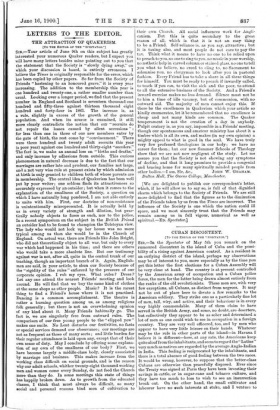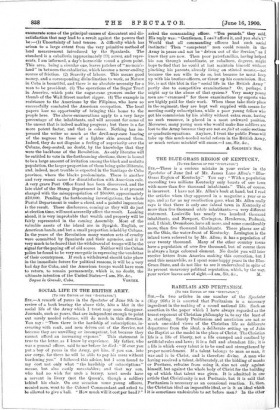CUBAN DISCONTENT. [To THE EDITOR OF THE "SPECTATOR."] Sin,—In the
Spectator of May 5th you remark on the rumoured discontent in the island of Cuba and the possi- bility of a rising against American control. As a resident in an outlying district of the island, perhaps my observations may be of interest to you, more especially as by the time you get this letter the first elections for a Cuban Assembly will be very close at hand. The country is at present controlled by the American army of occupation and a Cuban pollee force, the men for the latter being drawn almost entirely from the ranks of the old revolutionists. These men are, with very few exceptions, all Cubans, as distinct from negroes. It may not be out of place here to devote a few remarks to the American soldiery. They strike one as a particularly fine lot of men, tall, wiry, and active, and their behaviour is in every way highly commendable. Many of them claim to have served in the British Army, and some, no doubt, are deserters, but collectively they appear to be as sober and determined a lot of men as one could wish to see in occupation in a foreign country. They are very well officered, too, and by men who appear to have very little leisure on their hands. Whatever may be the rule in other parts of the island—in Havana I believe it is different—here, at any rate, the Americans keep quite aloof from the inhabitants, and seem to regard the" Latins" very much as natives are regarded by the average Anglo-Indian in India. This feeling is reciprocated by the inhabitants, and there is a total absence of good feeling between the two races. It would be wrong, however, to suppose that the better-class Cubans are otherwise than peacefully disposed. Ever since the Treaty was signed at Paris they have been investing their savings in cattle, or in sugar-cane and tobacco culture, and they have too much to lose to wish to see an insurrection break out. On the other hand, the small cultivator and labourer have no such interests at stake, and I venture to enumerate some of the principal causes of discontent and dis- satisfaction that may lead to a revolt against the powers that be:—(1) Uncertainty of land tenure. A difficulty which has arisen to a large extent from the very primitive method of land measurement introduced by the Spaniards. The standard is a caballeria (approximately 33f acres), and repre- sents, I am informed, a day's horse-ride round a given point. This area, being a circular one, leaves patches of " no-man's- land " in between the caballerias, which become a never-ending source of friction. (2) Scarcity of labour. This means good money, and a corresponding disinclination to work, as Nature in Cuba is bountiful, and there is no absolute necessity for a man to be provident. (3) The operations of the Sugar Trust in America, which puts the sugar-cane growers under the thumb of the Wall Street market rigger. (4) The example in resistance to the Americans by the Filipinos, who have so successfully combated the American occupation. The local papers lose no opportunity of bringing this home to the people here. The above enumerations apply to a very large percentage of the inhabitants, and will account for some of the unrest that is indeed making progress; but there is a far more potent factor, and that is colour. Nothing has im- pressed the writer so much as the devil-may-care bearing of the negroes to those of a lighter skin around them. Indeed, they do not disguise a feeling of superiority over the Cubans, deep-seated, no doubt, by the knowledge that they were the backbone of the Revolution. As only literates will be entitled to vote in the forthcoming elections, there is bound to be a large amount of irritation among the black and mulatto population, the larger proportion of them being quite illiterate, and, indeed, most trouble is expected in the Santiago de Cuba province, where the blacks predominate. There is another and very recent cause for dissatisfaction with American rule. A very grave Post Office fraud has been discovered, and the late chief of the Stamp Department in Havana is at present charged with the misappropriation of $50,000, approximately £10,000. Pending the forthcoming investigations, the whole Postal Department is under a cloud, and a painful impression is the result. These disclosures, coming as they will do just at election time, will most assuredly affect the result. Looking ahead, it is very improbable that wealth and property will be fairly represented in the coming Assembly. Most of the valuable assets of the island are in Spnish, English, or American hands, and but a small proportion is held by Cubans. In the years of the Revolution many wanton acts of cruelty were committed by Spaniards and their agencies, and it is very much to be feared that the withdrawal of troops will be the signal for the paying off of old scores. Neither will the Cuban police be found to be very energetic in repressing the vendettas of their countrymen. If such a withdrawal should take place in the immediate future for political reasons, it will be a very bad day for Cuba, and the American troops would have soon to return, to remain permanently, which is, no doubt, the ultimate intention of the United States.—I am, Sir, &c.,







































 Previous page
Previous page